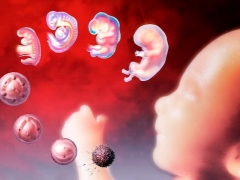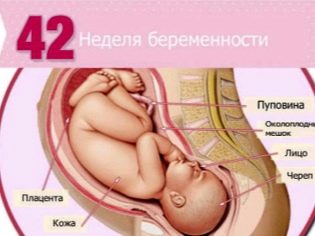How many days does the pregnancy last from the day of conception?
The difficult period of pregnancy, most women later recall as the happiest time, bright period of time, filled with amazing feelings and fascinating discoveries. It is difficult to find a woman in the world who would not like to experience these feelings again. They firmly bump into the memory. What is the term of carrying a baby and how long it actually lasts, we will tell in this article.
Period to delivery in numbers
Pregnancy from the day of conception to the day of birth can have a different duration. The day, which is defined as the expected day of childbirth - this is only an approximate guideline, which allows doctors and the very future mother not to get confused in terms.
In obstetrics it is customary to calculate the duration of pregnancy according to the Negale rule. It states that a pregnancy lasts exactly 280 days from the start of the cycle. In other words, the countdown starts from the first day of the last menstruation, which occurred before the onset of pregnancy.
As you know, conception is most likely on the day of ovulation or during the day after it. Ovulation occurs in the middle of the cycle, and therefore an average of 38 weeks or 266 days passes from conception to delivery.
Pregnancy is calculated in obstetric months, which differ from the calendar month that is common for most people to understand. In a calendar month, there may be 30 days and 31 days, the shortest month, February, usually has 28, and in leap years 29 days. Obstetric month - exactly 4 weeks, regardless of how it is called in the calendar.
In this way, 9 months of pregnancy in national terms, these are 10 obstetric months, or exactly 40 weeks from the date of the last menstruation, or 38 weeks from the date of conception.
This whole period is divided into three main periods, each of which is called a trimester. First trimester is time from the beginning of pregnancy to 13 weeks. During this period the most important processes take place - laying the organs and systems of the baby, their formation. The second trimester is the period from 14 to 27 weeks, during this period the baby is growing rapidly, the interaction in the work of all its organs is being debugged. During the third trimester from 28 to 40 weeks, the baby is gaining weight and preparing for birth.
What affects the timing?
Pregnancy can last 38 obstetric weeks, and 40, and even 42 weeks. All these terms indicate that the child is full-term, ready for birth. Pregnancy from 42-43 weeks is considered worn. On the estimated date of birth, calculated according to the Negale rule, only 5% of children are born, according to statistics. Why does one woman have a longer pregnancy and another less?
The answer to this question is medicine unknown. Religious people say in this case that only the highest forces know when the kid should appear on earth. Doctors believe that the duration of pregnancy is influenced by the duration of the implantation period, when the egg moves along the fallopian tube to the uterus, the duration of implantation, as well as during the pregnancy itself.
So, for women who were born on the 43rd week of pregnancy, the chances of carrying their child more than the standard 40 weeks are higher. The hereditary reasons for prolongation of gestation are one of the most likely.
It has long been observed that pregnancy lasts longer in women who lead a measured and relaxed lifestyle. Unperturbable future moms have the ability to pererenivat their children, while the easily excitable and nervous the fair sex more often give birth to 39 weeks of pregnancy.
It is noticed that women who are afraid of labor pain give birth later than women who are morally ready for childbirth. The state of health of the mother and the fetus, the state of the placenta, dietary habits and lifestyle of the future mother can affect the duration of the intrauterine stay of the baby.
More often than others, women who have decided to give birth after 36 years of age carry the child over, and premature births occur more often in women who already have several children.
Components of natural processes
Scientists have calculated and found out that the human cub for a more complete development is required to be in the womb for at least 16 months from the moment of conception. Then boys and girls will be born stronger, ready to repel all the threats of an aggressive environment, having developed instincts for self-preservation and survival.
But the anatomical features of the structure of the female body will not allow such a large child to pass through the birth canal, so nature has made sure that the pregnancy lasted as long as possible, so that the baby could be born naturally.
It is believed that for the first 7 months after birth, the crumb continues to develop at the same pace that was set by nature in the womb, and then the intensity of the processes and the biological rhythms of the child’s body change, slow down, become more “earthly”.
40 weeks - the optimal duration of pregnancy. After 42 weeks, the baby becomes uncomfortable in the close uterus, where the amount of water decreases, and the worn placenta can no longer fully feed the baby and provide it with oxygen. Premature birth before the 37th week of pregnancy is a direct threat to the survival of the child, because his lungs are not yet considered mature, the nervous system is not ready to work outside of my mother's abdomen, and the amount of subcutaneous fatty tissue cannot guarantee that the baby can maintain the desired body temperature in a new habitat.
Stimulation of childbirth
A few years ago in obstetrics it was considered quite normal and common practice to stimulate childbirth for all women who crossed the date indicated as the expected date of birth. However, a huge number of complications in labor activity and the further development of children, who were “hurried” to be born, led doctors to the idea that interference with the laws of nature cannot end with anything good for a person.
Therefore, now to the stimulation of labor activity is resorted to only in extreme cases, when further intrauterine stay may pose a danger to the life and health of the baby or his mother. Gradually, progressive medicine begins to find a common language with the wise nature, the main principle is the principle of non-interference in the laws of the universe.
The birth of a child is one of the biggest mysteries and mysteries, so that only the baby knows for sure when his day will come.
About how many days the pregnancy lasts from the day of conception, see the following video.





















